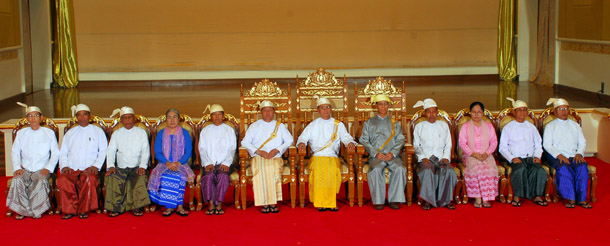Members of Burma’s Parliament are preparing to make their next move after President Thein Sein told them on Monday that he would not take action against the country’s Constitutional Tribunal in response to MPs’ demands that the judicial body reverse a controversial decision made earlier this year.
In the latest development in a dispute that is pitting Burma’s legislature against the judicial and executive branches of the country’s new quasi-civilian government, Thein Sein told MPs that if they are unhappy with the tribunal’s role, they should seek to amend the Constitution.
In a letter dated Aug. 20, Thein Sein urged MPs not to allow the row to undermine the common purpose of the three branches of the government to continue making strides toward democracy. However, if they are intent on pursuing the matter, he said they should exercise their rights under Chapter 12 of the Constitution, which relates to constitutional amendments.
The move comes less than a week after Lower House Speaker Shwe Mann suggested that MPs should initiate impeachment proceedings against the tribunal if Thein Sein doesn’t respond to their complaints.
The MPs’ grievances stem from a tribunal decision reached in March of this year that denied parliamentary committees the status of Union-level organizations. Since then, MPs have grown increasingly resentful of the government-appointed tribunal’s power to limit their influence, which many see as undemocratic. Earlier this month, 301 MPs signed a petition to demand that Thein Sein do something to overturn the tribunal’s decision.
“We don’t have a lot of freedom to make laws, because they [the Constitutional Tribunal] are sitting here in Parliament, breathing down our necks,” said Ba Shein, a lawyer and Lower House MP from the Rakhine Nationalities Development Party.
“We are going to tell them they don’t have the right to sit here. We will fight to remove them from Parliament by legal means,” he added.
Thein Sein’s insistence that it would be “unfair” and unconstitutional to force the tribunal to resign over the dispute, since it was merely acting in accordance with its responsibilities as prescribed in the Constitution, has angered MPs, who say he was the one behind the March decision.
“How can he [Thein Sein] respond fairly to our request when he is the one who told the tribunal not to accept our committees as Union-level organizations?” said Ba Shein.
The dispute began in February, when the attorney-general, acting on behalf of the president, asked the tribunal to decide on the status of committees and other bodies formed by Parliament.
The tribunal determined that these bodies could not be designated as Union-level organizations because, under Parts I and II of Section 97a of the Constitution, Union-level bodies can only be appointed by the president with the approval of the Union Parliament.
In response to Thein Sein’s refusal to address the MPs’ dissatisfaction with the ruling, lawmakers said they plan to launch legal proceedings against the tribunal on Wednesday.

















